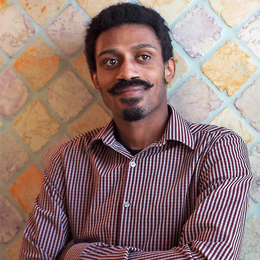
Next Generation
Self-professed “sci-fi geek” James Ellerby goes boldly where few others have gone before.
James Ellerby has gotten used to beating the odds.
Born with HIV at the height of the AIDS epidemic, Ellerby was not expected to live long enough to see his fourth birthday. Today he and his wife live in Harrisburg, where they are adding to an already vibrant arts and culture scene. He has his own production company, Blue Owl Films, and is on his way to becoming a force in science-fiction storytelling.
“I love stories, I love narrative, and I love taking people far away from their normal lives,” says Ellerby, whose acting career began in the Pennsylvania Renaissance Faire and its sister across the river in New Jersey. “With Blue Owl Films, I want to make productions that are accessible to the everyday person.”
One of his current projects is The Golden Record, a new play by Micah Kosstrin-Greenberg that pioneers the use of virtual theater for science fiction. Ellerby is directing and producing the online play, which runs through the end of July. One of the screenings benefits Camp Dreamcatcher in Kennett Square, a camp for children whose lives have been affected by HIV/AIDS.
We spoke with Ellerby about The Golden Record, how HIV affected his young life, and why his past may have enabled him to cope with the pandemic better than most.
Q&A
Tell me about The Golden Record and why you wanted to be involved.
I met Micah at the New Jersey Renaissance Faire in 2019. The pandemic put the world in limbo, and that’s when Micah wrote the play. He reached out to “Ren Faire” actors he had worked with, including me, but I was busy the night he had the read through. I got the chance to watch the read through with the actors, and I thought: This is a cool story. I’m a sci-fi geek, too, so I reached out to him. We were just chatting about what everybody was doing and I said, “I started a production company.” He wanted to turn The Golden Record into something bigger, and as I kept reading through the script, I knew there was something there. I knew I had to be involved. I love sci-fi’s ability to pull you into another world. It makes the unbelievable believable, and it lets us dream what we could be. … I feel like The Golden Record is a new interpretation of that spirit.
The play is described as “virtual sci-fi,” where every show will be unique and the audience will have a hand in the outcome. Can you describe the experience?
It’s an interactive online experience. At the heart of the interaction is the AI character, a new being, who is just coming into her own. Who she is will be dependent on how the audience interacts with her, how they guide her. It’s like watching a child go from learning how to walk to becoming a teenager, all in the span of an hour. Audience participation is vital; it’s the lifeblood of the play. When you come to interactive theater, you get to interact and have the time of your life.
Did you always think you would have a career in the creative arts?
One of the things that drew me to The Golden Record is that it was born during a pandemic, and so was I. I was born with HIV in 1987, and HIV has affected and guided my life in a number of different ways. I was always a very science-based kid. Combine that with the fact that I kind of grew up in hospitals. As I got older, I realized how much my early life was kind of a gift. They didn’t think I would make it to the age of four; I was a Make-A-Wish kid. I didn’t have a lot of prospects for what to do with my life. … I lived in the moment because I had to.
One of the screenings benefits Camp Dreamcatcher, which is a camp for children whose lives have been affected by HIV and AIDS. You attended the camp as a child. How did that experience impact your life?
Back then it was called Camp Rainbow. … Being a young black boy with HIV playing on a swing set, everything was fine until I skinned a knee. The second someone found out [I had HIV], they kept their distance. Camp Dreamcatcher was a yearly retreat from all that. Everybody was there for the same reason; it was made specifically for kids who couldn’t go to camp. It also provided a lot of emotional healing and a few emotional scars. At camp, every year you would go back and realize you might not see your friend again, because someone might not be winning their battle. … There were a lot of people there who were caring, and they made us feel safe, wanted, and accepted. To us, it was just camp.
I have a dark sense of humor, so when the coronavirus came, everyone was freaking out. I’d joke with friends of mine, “Oh, is this your first deadly pandemic?” To me, there was almost a dark solace in the fact that I have a deadly virus and I survived, but not everybody did. I’m living proof that it’s not the end of the world.
Photograph courtesy of Blue Owl Films
Published (and copyrighted) in Suburban Life magazine, July 2021.


